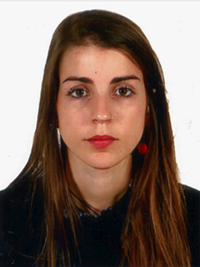Laia Gemma Garcia Fernandez

XXXIV Cycle - (A.A. 2018-2019)
IDAUP
Home Institution: University of Ferrara
Scholarship
Curriculum: Architecture (ICAR12)
Research Topic: Design methods & sustainable buildings
Tutor DA-UNIFE: Roberto di Giulio
Tutor Polis University: Saimir Kristo
Nationality: Spanish
Email: grclmm@unife.it
Profile
Biography
Born in Barcelona in 1992, Laia Gemma García Fernández is an international PhD candidate in Architecture and Urban Planning (XXXIV cycle) at Ferrara University. She started studying architecture at Granada University, Spain, and then moved to Ferrara University after taking part in an Erasmus mobility programme there. Her master graduation thesis entitled ‘Old Habits, New Ideas: cooperation project to build a working dispensary’ was based on a collaboration with architectural NGO C-re-a.i.d. to introduce innovative building techniques to a remote Maasai area in northern Tanzania. Laia had started her research in Africa in 2016, when she first participated in a C-re-a.i.d. Groundwork Project for architecture students consisting in designing and managing the construction of a women's meeting centre. Since the project was completed, it has been published in several international architectural magazines and websites. At present Laia is a C-re-a.i.d. team member working as a development architect on different projects, such as the actual building of the dispensary designed during her master thesis. She firmly believes universities can play a very important role in the field of international cooperation. Therefore since 2018 she has also held workshops and seminars on sustainable architecture in developing countries for the students of Granada University with a hands-on follow-up in Tanzania.
As an international PhD candidate Laia hopes to continue her research into alternative building techniques for the sustainable urbanisation of developing countries in a rapidly changing modern world.
Research skills
Affordable building | Sustainability | Feasibility | Innovative technologies | Raw materials
Scientific activities
ORCID ID:
0000-0001-5480-0335
IRIS UNIFE ID:
rp43149
Doctoral research
Economic, social and environmental sustainability in international cooperation architecture projects for developing countries
Affordable housing is needed all over the world, and everybody deserves a home that is safe, hygienic, sustainable and well adapted to their environment and cultural circumstances. In order to provide sustainable, affordable and ecological buildings, we need to examine from the materials from which buildings are constructed. This work will focus on the research of locally available raw materials and the possibility of turning them into sustainable building materials. The aim is to find new strategies and techniques using raw materials, to improve buildings’ comfort, sustainability and affordability. This is in accordance with UN-Habitat objectives and the goals for sustainable development. The fluid transmission of knowledge between different organizations and architects working to improve the quality of buildings in developing countries, make it possible for traditional techniques, side by side with new technologies, to find a common direction, in order to increase the performance of raw and vernacular materials. The aim of this research is to investigate those practices which need to be improved and the tools that may add value, increasing their performance making them functional to specific requirements, according to the current conditions. In order to reduce the field of analysis, this proposal will focus on sustainable techniques improving the quality of buildings in north Tanzania. The case study concerns building and environmental contexts, to be further extrapolated to any rural or informal settlements. This research, therefore, requires close contact with the native community, to make sure that any implements and new techniques will be accepted by the population. It is always important to listen to the opinions of the community in order to work together to find the best way to conserve the environment by innovating building techniques. The goal is to make them sustainable, affordable, beautiful and environmentally friendly.
Keywords
Rural settlement | Urban development| | Vernacular techniques | Community resilience | Environmentally aware

